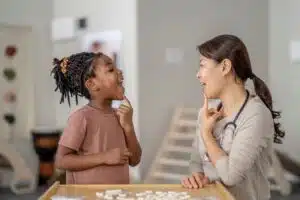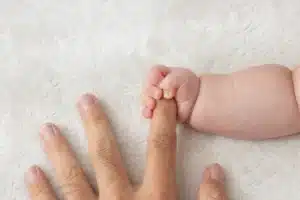By Madison Gwizdalski MS, CCC-SLP
Do you ever have a difficult time understanding what your child is saying? Do you find them making mistakes for specific sounds? Maybe those speech errors that you thought were cute when they were younger are getting…. not so cute?
Let’s check out what speech sound development looks like in typically developing kiddos. Research by Hustad, et al. (2021) has shown us the following:
When unfamiliar adults (not parents of the children studied!) were asked to transcribe children’s speech, without any context for what they were saying:
- By age 3, most children are understood 12% of the time by unfamiliar adults
- By age 4, most children are understood 40% of the time by unfamiliar adults
- By age 5, most children are understood 65% of the time by unfamiliar adults
- By age 6, most children are understood 80% of the time by unfamiliar adults
- By age 7, most children are understood 87% of the time by unfamiliar adults
Remember though – parents should be understanding their child much more than unfamiliar adults. Furthermore, we usually have a little context during conversations, so we most likely will understand more than 12% of what our toddler is saying when we know what the topic is.
Still a little confused about if your child is on the right track? We can look at when specific sounds develop to see if our children are meeting those milestones. The following chart indicates which sounds should develop by the end of each year.
(https://www.boisechatterbox.com/blog/speech-sound-development-chart)
- By 3 years: p, b, d, h, n, m, w, t, k, g, f, j, y, ng (as in ‘sing’)
- By 4-5 years: f, sh, zh, ch, j, s, and cluster sounds tw, kw, gl, bl
- By 6 years: l, r, v, and cluster sounds pl, kl, kr, fl, tr, st, dr, br, fr, gr, sn, sk, sw, sp, str, spl
- By 7-8 years: th, z, and cluster sounds sm, sl, thr, skw, spr, skr.
What can I do if I have concerns about my child’s speech sound production?
If your child is not meeting these milestones, you can also try some of these strategies to help your child at home:
- Choose words to practice during daily routines and play: For example, if your child is having a hard time with “k”, you can play cars and practice “car”, “crash”, “key”
- Encourage your child to watch your mouth when you say sounds. You can give them some great tips by talking about how you move your lips and tongue to make certain sounds.
- Rephrase your child’s errors and repeat it back to them. You don’t have to remind them that they said it wrong, but you can rephrase it and show them how to say it correctly!
And lastly…. a speech therapist can help you! Contact Uplift Therapy Center for an evaluation to determine if your child could benefit from therapy.




